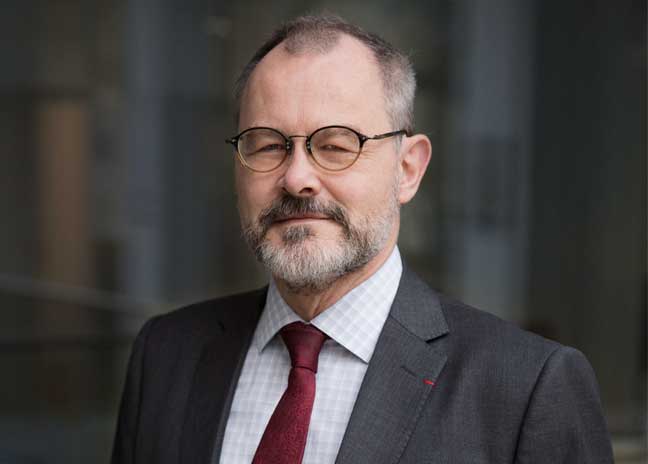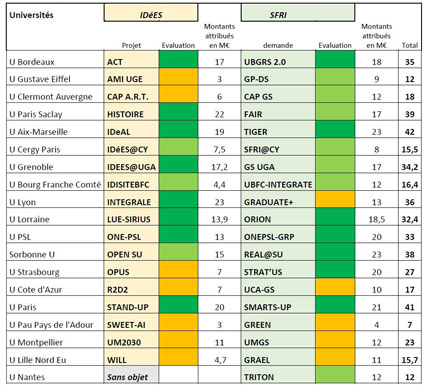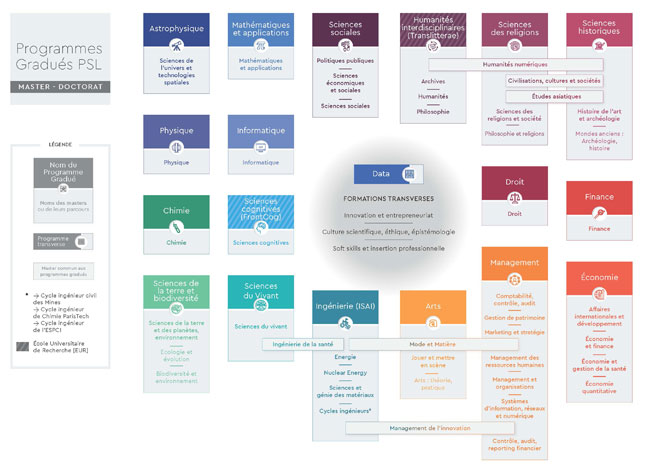SFRI and IDéES Results: “It’s impossible to project academic excellence without the political will and appropriate resources”
On July 1, France’s Ministry of Higher Education, Research and Innovation published the winners of the SFRI and IDéES calls for proposals submitted as part of France’s IDEX and I-SITE initiatives. The two proposals submitted by Université PSL were judged excellent and approved by the jury during the first round of review. Hubert Bost, Vice President for Graduate Research and Education, tells us about these encouraging results.

Can you tell us briefly about the importance of the SFRI and IDéES calls for proposals?
Those two acronyms refer to two major calls for proposals for the future of universities that conduct intensive research. SFRI and IDéES were launched by the French National Research Agency (ANR) last October for universities designated as IDEX, or Initiatives for Excellence, institutions (which include Université PSL) and I-SITE (Initiatives for Science, Innovation, Territories and Economy) institutions. The SFRI call for proposals is designed to help those universities expand “the impact and international appeal of research-based training,” while the IDéES program is intended to support each site’s “efforts toward transformation and integration.” The 19 projects submitted by the IDEX and I-SITE schools were evaluated by a specially convened international jury. Each of the projects received a share of the total endowment – €500 million, funded by France’s "Investments for the Future” (PIA) program – over the next nine years. The government believes that together, these two investment programs will promote the expansion of France’s research universities. They represent a follow-up to the EUR (Écoles Universitaires de Recherche) call for proposals launched in March 2017 as part of the third round of PIA funding, when two ENS–PSL projects were awarded funding: Translitterae and FrontCog. Both have been fully integrated into PSL’s 18 graduate programs as part of an overall structure that the international SFRI evaluation jury praised as highly suitable.
Can you tell us about the scope of the IDéES call for proposals?
The IDéES call for proposals is something new. The idea was to propose a comprehensive project that includes “large-scale” initiatives and specifies how they will be implemented. The ANR invited us to incorporate our services and infrastructure (e.g., our information system, student orientation services, quality policy, etc.) into our overall proposal. That’s essential: without shared, appropriate resources for implementing our policy, we cannot project academic excellence; without reliable data, the university can’t oversee its operations, develop a strategy or fund its projects. As a former president of a PSL member school and current Vice President of Research and Graduate Education, I’m delighted about the launch of this call for proposals.
We focused on three areas, based on PSL’s strategy:
- The quality process and support for management,
- Convergence of our information systems,
- Raising the University’s international profile and fundraising.
Those issues require that we pool our services to a much greater degree than we currently do, for lack of the necessary resources. With this new funding from the "Investments for the Future” program, we will be able to take action, or build on the actions we’ve already taken, in those three areas.
How were the proposals submitted by Université PSL viewed?
The two projects submitted by PSL were both evaluated and selected by the jury during the first round of review. In its assessment report, the international jury had this to say about our system of graduate programs and multischool curricula: “It is probably the best model that could be devised given the various constraints under which PSL is required to operate.” Thanks to SFRI and IDéES, Université PSL will have €33 million over nine years to expand its programs and activities. Although that sum isn’t adequate to fund every project that we hope to carry out, it’s a very good outcome. In fact it’s excellent, judged in proportion to PSL’s size, since we have a student body of 17,000 whereas, for example, Aix-Marseille University has 80,000 students and Sorbonne University has more than 65,000. We’re pleased that university enrollment figures, which often count for so much, didn’t take precedence over the intrinsic quality of the applications.

What comes next?
The 18 PSL graduate programs that were described and approved in our SFRI proposal was be welcoming their students to campus at the start of the academic year this fall. The graduate programs are teaching and research programs that were largely inspired by the graduate schools found at U.S. and U.K. universities, and they were being designed, structured, developed and created while we were responding to the call for proposals. They had begun operating on a reduced basis even before we heard the jury’s decision, and now we’ll be able to expand them. They cover the university’s major areas of research – the humanities and social sciences, engineering, the hard sciences, organizational science, the arts and so forth – and they aggregate the research and training activities carried out at PSL’s component schools, our associate members and the university’s partners.
The graduate programs are designed first and foremost for students at the Master’s level or higher who want to receive training that is firmly rooted in research, including research practices and methods. Although they may seem unusual compared to the typical French model, the graduate programs are actually something that international students can readily understand. The grant from the "Investments for the Future” program will contribute significantly to developing those graduate programs, but it won’t be enough to fund them completely. So we’ll need to continue searching for other sources of funding.

